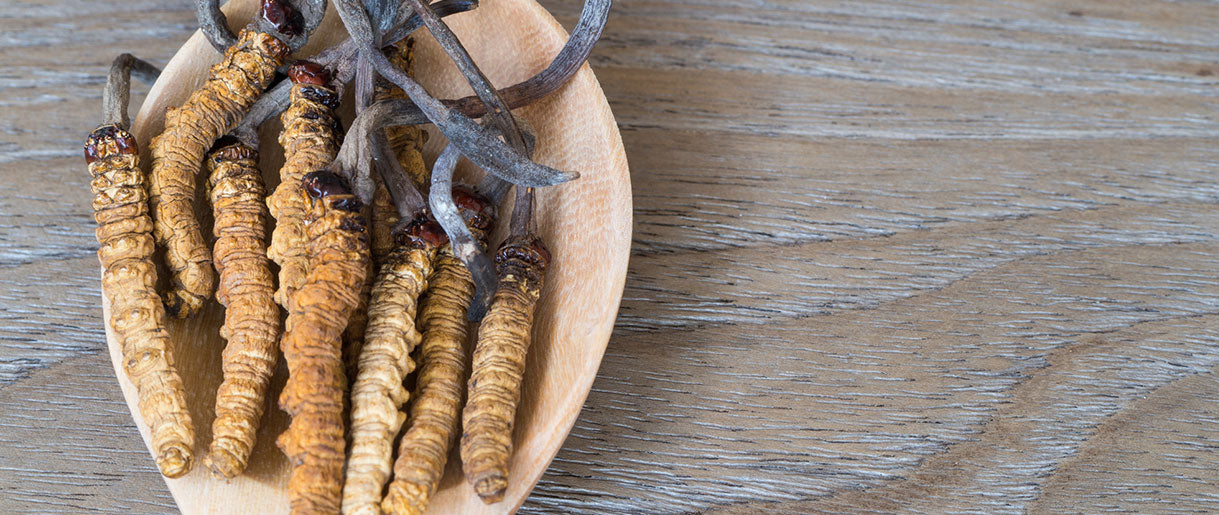Dopamine has recently made headlines. But why is dopamine on everyone's mind? Dopamine's influence on pleasure is well known, but this unique neurotransmitter is involved in much more.
It can aid with concentration and staying on task, for example. Dopamine also helps the brain remember significant moments, whether good or unpleasant. Dopamine might be thought of as a "chemical of more."
You always want more of it because it is the primary neurotransmitter that makes you happy. So, what are some natural ways to boost this intriguing neurochemical? Cordyceps for dopamine!
Cordyceps, a fungus with a long history of usage in traditional medicine, has recently acquired prominence due to its wide variety of possible health advantages. One area of interest is the Cordyceps dopamine benefits.
So, does Cordyceps increases dopamine? Let’s explore!
Understanding Dopamine

Dopamine(1) is the neurotransmitter of wanting, specifically wanting more, and is synthesized in the ventral tegmental area of the brainstem and the substantia nigra. It concerns anticipation, opportunity, love, and maximizing future resources. Dopamine is released when you anticipate a reward (sex, food, shopping, money) or when you receive a pleasant surprise. It involves motivation (wanting to achieve a goal), mood, memory, and attention.
Dopamine also regulates motor activities, which is why you get excited when your team wins or your child scores a home run. While serotonin is known as the "happy" hormone, dopamine controls our reward and pleasure centers.
Introduction To Cordyceps

Cordyceps(2) is a fungus with over 400 species, the most well-known and studied being Cordyceps sinensis and Cordyceps militaris. For years, these mushrooms have been utilized in traditional Chinese and Tibetan medicine, and modern study is beginning to unravel the science behind their potential health advantages.
Wild cordyceps are rare and expensive because they thrive on the larvae of insects in the Himalayas. Due to their scarcity, cultivated cordyceps, frequently grown on rice or soybean substrates, have become more popular and accessible for supplementing.
Cordyceps And Dopamine

Cordyceps may impact dopamine levels in the brain, according to research. Cordyceps compounds, including adenosine, cordycepin, and polysaccharides, have been proven to influence dopamine production and release.
An increasing body of evidence suggests a link between Cordyceps and dopamine control.
Cordycepin has been shown in animal studies to have neuroprotective properties. The compound may boost dopamine release, either by reducing dopamine reuptake or enhancing dopamine synthesis, according to research(3).
Cordyceps is also an abundant source of adenosine, which regulates dopamine release in the brain. Adenosine can affect dopamine release and activity by interacting with dopamine receptors. This interaction could explain(4) some of the observed cordyceps effects on dopamine levels.
Cordyceps polysaccharides(5) have been reported to have antioxidant and anti-inflammatory effects, which may aid dopamine modulation indirectly. These chemicals may help protect dopamine-producing neurons and maintain healthy dopamine levels by lowering oxidative stress and inflammation in the brain.
Given the relationship between Cordyceps and dopamine, Cordyceps supplementation may provide various health benefits, such as:
Cognitive function: Cordyceps may improve focus, attentiveness, and decision-making abilities by promoting healthy dopamine levels.
Mood and well-being: Higher dopamine levels are linked to a stronger sense of well-being and reduced symptoms of depression and anxiety.
Motor function: Cordyceps may assist in maintaining or improving motor function in people with Parkinson's disease or other movement disorders because dopamine is crucial for motor control.
Addiction recovery: Individuals recovering from drug or alcohol addiction may benefit from the relationship between cordyceps and dopamine, as maintaining adequate dopamine levels can lessen cravings and withdrawal symptoms.
Benefits Of Balanced Dopamine Levels

Dopamine must be balanced for happiness and a good sense of drive. It causes problems when there is too much or too little of it. Too much dopamine, for example, has been linked to agitation, obsessions or compulsions, psychosis, and aggression.
Depression, low motivation, apathy, exhaustion, boredom, Parkinson's disease, sugar cravings, impulsivity, and thrill-seeking and conflict-seeking behavior can all result from a lack of dopamine. Low dopamine levels are also regarded to be the root cause of ADHD (which is frequently associated with short attention spans, distractibility, procrastination, disorganization, and impulse control disorders).
Additional Health Benefits Of Cordyceps

Cordyceps has immune-boosting, anti-metastatic, anti-tumor, anti-inflammatory, antioxidant, insecticidal, hypolipidemic, antibacterial, hypoglycemic, neuroprotective, anti-aging, and renoprotective properties on the human body.
For ages, it has been hand-picked and dried in traditional Chinese medicine to treat weariness, kidney disease, poor sex drive, and various other ailments. Cordyceps' lengthy history and excellent benefits may be why food supplements and other items containing Cordyceps are so popular.
Here are the potential benefits of Cordyceps based on scientific research:
- Improves physical performance.
- Reduces physical fatigue.
- Polysaccharides from the Cordyceps show immunoenhancing and antioxidant activities.
- Has an anti-aging effect.
- Protects mitochondria.
- Boosts sex drive.
- Improves brain function.
- May help control type 2 diabetes.
- Has potential anti-tumor activity.
- Helps treat chronic kidney disease.
- Protects the heart.
- Improves liver function.
How To Incorporate Cordyceps Into Your Life

The following are some great ways to consume Cordyceps:
1. Tea
In a pan, combine 6-8 Cordyceps fruit bodies and a cup of water. Bring the water to a boil. After a minute or so of boiling, drop the heat to extremely low and simmer for 15 minutes. You should aim for two cups every day. What to do with the fruit bodies after boiling? Consume them by dicing them into soups or sauces.
2. Raw
Cordyceps fruit bodies can be eaten uncooked. Aim for three to six grams every day.
3. Supplement capsules
Estimating dosages can be difficult because fresh mushrooms, such as Cordyceps, can contain up to 90% water. However, dried Cordyceps can be crushed and eaten by the teaspoon or in 400 mg capsules. You can take two capsules in the morning and two at night for immune support.
Cordyceps supplement capsules are widely accessible at health food stores and online.
The dose varies depending on factors such as the exact supplement used, individual demands, and intended goals.
Most studies on Cordyceps have used dosages ranging from 1,000 to 3,000 mg daily, usually divided into two or three doses. It is best, to begin with a lower dose and gradually increase as needed, always following the manufacturer's instructions and seeking the advice of a healthcare expert if necessary.
FAQs About Cordyceps Dopamine
Is Cordyceps Good For Depression?
Low levels of the feel-good hormone dopamine and serotonin in the brain cause depression. Research has shown that the Himalayan fungus Cordyceps making it helpful for alleviating depression symptoms.
Are Cordyceps Stimulants?
Cordyceps mushrooms are medicinal mushrooms and are not stimulants. Unlike magic mushrooms, they do not have psilocybin, the compound that stimulates your brain.
What Does Cordyceps Do To The Brain?
Cordyceps mushroom has anti-depressant-like effects. The mushroom may help enhance your mood, making you less anxious.
Key Takeaways
Cordyceps dopamine research is a promising field, with studies indicating that the mushroom may potentially support healthy dopamine levels and increase general well-being. While further research is needed to thoroughly understand the mechanisms of Cordyceps and its long-term effects on dopamine control, using the fungi in a well-balanced wellness program may provide cognitive, emotional, and motor function advantages.
References
- Dopamine: Functions, Signaling, and Association with Neurological Diseases, (1)https://pubmed.ncbi.nlm.nih.gov/30446950/
- Effect of Cs-4 (Cordyceps sinensis) on exercise performance in healthy older subjects: a double-blind, placebo-controlled trial, (2)https://pubmed.ncbi.nlm.nih.gov/20804368/
- Cordycepin Exerts Neuroprotective Effects via an Anti-Apoptotic Mechanism based on the Mitochondrial Pathway in a Rotenone-Induced Parkinsonism Rat Model, (3)https://pubmed.ncbi.nlm.nih.gov/31486758/
- Interactions Between Adenosine Receptors and Cordycepin (3'- Deoxyadenosine) from Cordyceps Militaris: Possible Pharmacological Mechanisms for Protection of the Brain and the Amelioration of Covid-19 Pneumonia, (4)https://www.fortunejournals.com/articles/interactions-between-adenosine-receptors-and-cordycepin-339-deoxyadenosine-from-cordyceps-militaris-possible-pharmacological-mecha.html
- Polysaccharides from the Medicinal Mushroom Cordyceps taii Show Antioxidant and Immunoenhancing Activities in a D-Galactose-Induced Aging Mouse Model, (5)https://pubmed.ncbi.nlm.nih.gov/22536281/










Let Us Know Your Comments